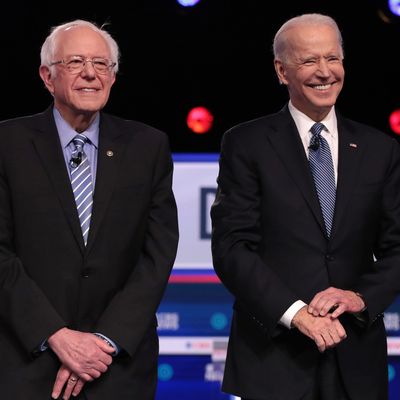
In a joint livestream on Monday, Senator Bernie Sanders officially endorsed former vice-president Joe Biden for president. “Today, I am asking all Americans, I’m asking every Democrat, I’m asking every independent, I’m asking a lot of Republicans, to come together in this campaign to support your candidacy,” Sanders said, “to make certain that we defeat somebody who I believe — and I’m speaking just for myself now — is the most dangerous president in the modern history of this country.”
The announcement comes days after Sanders suspended his campaign and ended a chaotic primary process which looked for a while as though it would send the Vermont socialist to take on Donald Trump. But Biden rallied after a few disastrous early primary showings and had amassed an insurmountable lead by the time Sanders left the race.
Biden, however, still faces real challenges in his bid to become a viable Trump challenger, and winning a Sanders endorsement was never really one of them. Though he and Biden occasionally crossed swords during the primary debates, the senator was certain to support Biden when his own campaign fell short of the prize. Sanders also has a good working relationship with Biden, which may have influenced him to be somewhat less critical of the former vice-president than his advisers would have liked. And he has always said that he would support the party’s nominee, a position he reaffirmed when he withdrew from the race last week. He congratulated Biden in a statement and said that he would work with the former vice-president “to move our progressive ideas forward.”
Monday’s announcement, then, was more than a formal endorsement. It’s a sign that Sanders intends to work on Biden’s behalf, just as he did for Hillary Clinton in 2016. But that doesn’t mean he’ll be able to bring all of his voters with him. Biden’s real challenge is now to assure Sanders voters that he’ll adopt even a few of his former opponent’s transformative social policies. He’ll have to earn their support, a fact he’s acknowledged in some public statements.
For some Sanders supporters, Biden might not be such a tough sell. Polls indicated that many considered Biden their second-choice pick for president. Others — especially young voters — will be harder to convince, and Biden’s conciliatory comments aren’t enough on their own to bring those Sanders supporters into the fold. With Biden, a considerable gap separates his public-outreach efforts from his actual ideology. Biden is a moderate who boasts of his ability to work with Republican colleagues. Sanders is an outsider, a critic of the Washington machine. The two positions don’t easily meld, even if the men themselves are friends. The onus is now on Biden to make more of an effort.
But he doesn’t seem to grasp the task at hand. Immigration activists have repeatedly asked him to account for the Obama administration’s record on deportation. But that reckoning looks far off, even with the announcement that Biden will form an immigration “task force” with Sanders.
In a tweet, the U.S. Youth Climate Strike declined to endorse Biden, and a coalition of youth organizations wrote to the Biden campaign urging him to move left on key issues, including immigration and the climate, in order to win its support.
The Democratic Socialists of America also reiterated a decision its members reached last year to endorse Sanders, and no one else, for president.
A much-touted compromise plan proposed lowering the age for Medicare eligibility to 60; this grudging and almost imperceptible move left ignores the rising appeal of Medicare for All and allows him to dodge the burden of substantively revising his proposals for health-care reform. (As introduced in the primary race, Biden’s version of a public option would have left 10 million people without health insurance.) Another compromise proposal, to forgive the undergraduate-student-loan debt of individuals who attended public colleges or historically black colleges and universities, falls far short of plans introduced by Sanders and Senator Elizabeth Warren during the primary. Overall, Biden’s unwillingness to move much to his left suggests there are significant limitations to how far Sanders can move him now that the primary is over.
Even if Biden did move more meaningfully to the left on some social-welfare policies, news that a former staffer has accused him of sexual assault will make his candidacy even more difficult for some Sanders supporters to stomach. Several women had already accused Biden of unsolicited touching and kissing that made them feel uncomfortable, and Biden’s accuser, Tara Reade, has now filed a criminal complaint against him with the Washington, D.C., police. Biden denies Reade’s claim, but his pattern of boundary-violating behavior isn’t so easy to dismiss. Sanders might be ready to throw his full weight behind Biden, but that won’t be entirely true of his base. The former vice-president may think he can win without the votes of the young, or of the left, but an enthusiasm gap helped sink Hillary Clinton. It may surface again.






























